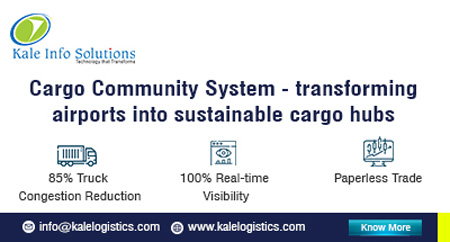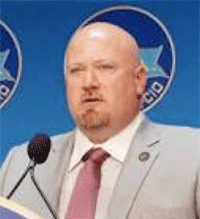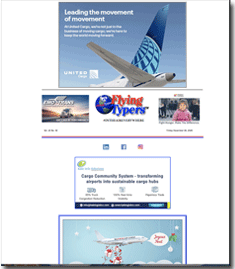
 |
 |
 #INTHEAIREVERYWHERE |
| Vol. 24 No. 2 | Tuesday January 14, 2025 |
| |
 |
Even if the public at large had not yet panicked for the anticipated strike in the east coast of the USA at the start of the New Year, those who work directly in logistics and international trade were more than alarmed. They had seen at other times the troubles and the inevitable disruptions propagating all over the international trade, with consequences both sides of the Atlantic, and beyond. The difference between the ILA and USMX obviously concerned a number of issues, including salaries, but everybody’s attention was captured by an almost surprising element, considering we are in the age of AI: “automation at ports, one of the most contentious topics during the negotiations.” This was the language which we heard from reputable sources to pinpoint the essence of the debate.  As
recently as Sunday week of January 5th, we heard of secret talks between
ILA and USMX to reach a deal that could avoid a strike hitting the ports
of the East and Gulf areas in the USA. There was more. In mid-December President-elect
Trump seemed to support the case by sharing ILA Executive Vice President
Dennis Dagget’s message to his 90 million followers. Clearly starting
his mandate in the middle of a bitter dispute would have not been ideal
for Mr. Trump. Powerful shippers’ organizations had urged the two
parties in dispute to find a solution, lest the “U.S. economy be damaged”.
Now we know that all the prayers were answered and a deal has been reached:
the strike will not take place, at least not right at the beginning of 2025.
Does this mean that tranquillity has returned on the eastern shores and
the ILA will now start working on other issues? Let us try to find out with
some expert opinions. As
recently as Sunday week of January 5th, we heard of secret talks between
ILA and USMX to reach a deal that could avoid a strike hitting the ports
of the East and Gulf areas in the USA. There was more. In mid-December President-elect
Trump seemed to support the case by sharing ILA Executive Vice President
Dennis Dagget’s message to his 90 million followers. Clearly starting
his mandate in the middle of a bitter dispute would have not been ideal
for Mr. Trump. Powerful shippers’ organizations had urged the two
parties in dispute to find a solution, lest the “U.S. economy be damaged”.
Now we know that all the prayers were answered and a deal has been reached:
the strike will not take place, at least not right at the beginning of 2025.
Does this mean that tranquillity has returned on the eastern shores and
the ILA will now start working on other issues? Let us try to find out with
some expert opinions. FlyingTypers has developed the ability to exchange views with the smartest and best informed personalities, those directly involved in the business of making any kind of goods available to customers all over the world. In a situation like this, we reached out to these excellent individuals and asked for comments. Even though the strike had been called off, they have been kind enough to provide their views on the issues we had evoked and we think this is still an insightful read, even though the strike will not take place. Questions and statements were prepared to reflect in particular on automation and possible job losses, as this was perhaps the main issue in ILA’s claims. One could argue that we seem to be unable to accept automation in ports, whilst we are completely relaxed when it comes to parting with our data, often containing sensitive information, to an endless list of companies working on the same data, which people like Musk, Bezos, Zuckerberg, etc. seem eventually to transform into money, a lot of money as we all know . . . If we can so peacefully accept a near monopoly on our lives that conditions our future, why can we not accept more automation in the ports with a view to achieving greater efficiency, in particular if there is a chance to bargain for additional jobs, as seemed to be the case this time? Have we been taken by a sudden luddite crisis, or is there something deeper and more difficult to grasp in this discussion? The automation trend in ports, e.g. Singapore, Hong Kong, Rotterdam, etc. seems to be extremely positive for international trade and maritime activities, why does the U.S. seem to differ so much on this point? Plenty of questions, admittedly some will remain open and unanswered. On the one hand we have the most technologically advanced nation and – side by side on the same table – we must deal with a kind of primeval fear of the machine. Let us not make mistakes here, I do not mean to say that technology adoption does not change the status quo, it does indeed, but in the end we have always seen that what is lost on one side is reconstructed on the other. I am personally old enough to have seen disruptions unsettle and destroy, but in the end most of what was lost in one way was regained in another. This is surely the case in some of the most technologically advanced harbours of the world, which are leading in efficiency, but also in their revenues. In places like Singapore, Hong Kong, Rotterdam and others the issue of unemployment or underemployment is not concrete. This being said, the process can be painful, as we have seen in many areas of the USA and Europe where deindustrialisation took its toll, but all in all we cannot say that we are worse off in 2025 than we were fifty, or even just twenty years ago, if we take these societies in their totality. It is probably true that wealth is pulled to the top even more than in the past and the happy few are even fewer, whilst the distance from the top is becoming greater for many of us. But is mechanization the force that creates these conditions? I sincerely do not think so. In my opinion this is more the result of many different factors at play, in particular of a financial nature, not necessary is it a consequence of automation. Obviously this is just my own personal opinion and I am sure there could be excellent arguments to the contrary. Yet, the machine is a sort of archetype in our minds and there is an instinctive reaction that suggests fear and defence. I shall stop at that, lest we took a journey to areas outside of our sphere. So let us get back to the parties involved in the strike. The two parties found the necessary compromise, and the news was summarized more or less with the same wording by many sources on January 8th. We might use the translation of the Newsblad Transport from the Netherlands, kindly provided by Nicolette van der Jagt of CLECAT: “The employers' organisation USMX and the International Longshoremen's Association (ILA) reached an agreement on Tuesday evening, finalising a six-year collective labour agreement. This agreement prevents new strikes in ports along the East and South coasts of the United States. A deadline had been set for January 15th. If no agreement had been reached by then, further strikes would have been held. That has now been avoided. Specific details of the new labour agreement have not yet been disclosed, as it awaits final approval from the union’s members. Negotiations for a new labour agreement have been challenging, accompanied by strikes last fall across approximately 36 ports. Work stoppages in these U.S. ports could have significant consequences, as they handle more than half of the country's total imports. The unions are particularly concerned about extensive automation in the ports and the associated job losses. Employers argue, however, that the competitive position of the ports is weakened without semi-automated cranes and other technological advancements.”  Nicolette
van der Jagt also made comments on behalf of the association she leads:
“CLECAT
welcomes the labour agreement reached between USMX and the International
Longshoremen's Association (ILA), preventing further strikes in critical
U.S. ports along the East and South coasts. These ports, handling over half
of U.S. imports, are essential for global supply chains, and avoiding disruptions
is a positive development for international trade. While automation is a
sensitive topic in labour discussions, European ports have demonstrated
that advanced automation is essential for competitiveness and efficiency.
A similar transition is necessary for U.S. ports to strengthen their role
in global trade. CLECAT supports collaborative approaches to implementing
technological advancements that balance operational efficiency with labour
concerns, ensuring resilient and competitive supply chain.” Nicolette
van der Jagt also made comments on behalf of the association she leads:
“CLECAT
welcomes the labour agreement reached between USMX and the International
Longshoremen's Association (ILA), preventing further strikes in critical
U.S. ports along the East and South coasts. These ports, handling over half
of U.S. imports, are essential for global supply chains, and avoiding disruptions
is a positive development for international trade. While automation is a
sensitive topic in labour discussions, European ports have demonstrated
that advanced automation is essential for competitiveness and efficiency.
A similar transition is necessary for U.S. ports to strengthen their role
in global trade. CLECAT supports collaborative approaches to implementing
technological advancements that balance operational efficiency with labour
concerns, ensuring resilient and competitive supply chain.” We
had also reached out to James Hookham, Director of the Global
Shippers Forum in London. This is the thoughtful consideration James
sent us: “The language of the ‘tentative’ agreement
between ILA and USMX has not yet been revealed, but it does seem to have
averted the immediate threat of a stoppage, which is the key thing for shippers,
especially those whose goods are at sea right now and therefore beyond the
point of recall or re-routing. In the event of a strike, GSF would hope
the FMC re-confirms its expectation that ports and shipping lines act in
a compliant, fair and reasonable manner. This would include deferring detention
and demurrage charges for the duration of the strike. After all, what costs
are actually being incurred by a terminal in these circumstances? There
is no doubt that a prolonged closure of the East coast and Gulf coast ports
would be harmful to the American economy due to the rapid shortages of goods
and inventory to American industry and consumers. The short stoppage in
October was still sufficient to delay urgent supplies heading to Florida
and other gulf states devastated by the hurricanes. Canadian ports could
offer limited alternative routings, but they too are locked in a long-running
labour dispute and the risk of sympathetic action cannot be ruled out. I
agree with your point that this would not be the backdrop the next President
would want on Inauguration Day so I feel sure that the tentative agreement
will survive until at least then. We
had also reached out to James Hookham, Director of the Global
Shippers Forum in London. This is the thoughtful consideration James
sent us: “The language of the ‘tentative’ agreement
between ILA and USMX has not yet been revealed, but it does seem to have
averted the immediate threat of a stoppage, which is the key thing for shippers,
especially those whose goods are at sea right now and therefore beyond the
point of recall or re-routing. In the event of a strike, GSF would hope
the FMC re-confirms its expectation that ports and shipping lines act in
a compliant, fair and reasonable manner. This would include deferring detention
and demurrage charges for the duration of the strike. After all, what costs
are actually being incurred by a terminal in these circumstances? There
is no doubt that a prolonged closure of the East coast and Gulf coast ports
would be harmful to the American economy due to the rapid shortages of goods
and inventory to American industry and consumers. The short stoppage in
October was still sufficient to delay urgent supplies heading to Florida
and other gulf states devastated by the hurricanes. Canadian ports could
offer limited alternative routings, but they too are locked in a long-running
labour dispute and the risk of sympathetic action cannot be ruled out. I
agree with your point that this would not be the backdrop the next President
would want on Inauguration Day so I feel sure that the tentative agreement
will survive until at least then.As a personal observation, the challenges of introducing automation are seen in many other industrialised countries and sectors with strong organised labour unions. The introduction of one-man train operation, or even driverless trains, is another example where 20th century technology and practices persist because the costs of toughing out the inevitable disputes would cripple the cash-flows of even the most tech-minded operators. And you need at least a reasonably cooperative workforce to facilitate the transition and to provide back-up to get through the teething problems. Whether you see this as a blockage on progress or a callous disregard for the human cost of automation depends on your politics and/or your stake in the process. It certainly seems more difficult to achieve this when there is a legacy of more labour-intensive processes, and an established culture of engagement with a workforce. Emerging economies are finding it easier to leap-frog these technologies and go straight to higher levels of automation. Much can be achieved with genuine consultation and the best interests of affected parties in mind, so it will be intriguing to see how the ‘automation’ issue is handled in any final ILA/USMX agreement and whether a genuine breakthrough has been arrived at or the automation has just been kicked down the road.” From Europe, whether represented at regional or global level, we hear that there is serious consideration for the issue of automation, even a certain level of satisfaction for having dealt with the issue of automation somewhat earlier. Whether this has been entirely resolved in Europe or the automation issue will return in future remains to be seen, but there is no sign in this direction right now. At this point it makes sense to hear the views of those who found themselves right in the middle of the situation. We have the benefit of hearing the views of two personalities who are directly involved in the business, as they are users of the services, without being directly involved in the dispute.  Kennon
Carter, Corporate Ocean Procurement Manager at EMO Trans, Atlanta, GA, USA
told us that “The agreement between the ILA and USMX could not
have come at a better time for the supply chain. A strike would have caused
existing pressure to a market that was already dealing with increased demand
from the Chinese New Year Holiday and carrier realignment of their assets
to support the new alliances. The realignment of the new alliances was expected
to stress the market without a work stoppage. A work stoppage would have
exacerbated the realignment of the alliances. Now that the strike is settled,
once Chinese New Year and alliance realignment is behind us, we should see
some normalization re-enter the market. Normalization will not be instantaneous,
but seeing it as a possibility on the horizon will be welcomed by many in
the industry.” Kennon
Carter, Corporate Ocean Procurement Manager at EMO Trans, Atlanta, GA, USA
told us that “The agreement between the ILA and USMX could not
have come at a better time for the supply chain. A strike would have caused
existing pressure to a market that was already dealing with increased demand
from the Chinese New Year Holiday and carrier realignment of their assets
to support the new alliances. The realignment of the new alliances was expected
to stress the market without a work stoppage. A work stoppage would have
exacerbated the realignment of the alliances. Now that the strike is settled,
once Chinese New Year and alliance realignment is behind us, we should see
some normalization re-enter the market. Normalization will not be instantaneous,
but seeing it as a possibility on the horizon will be welcomed by many in
the industry.” Our
friend Michael White, CEO and Founder of Trade Network Consultant LLC and
eminent personality in aviation, air cargo and logistics at large for several
decades recently produced for his regulars a commentary that we have been
authorized to partially reproduce. This is what Michael had to say on the
perspective in the new year, having regard to the conditions of the labour
market: “As we enter 2025, the air cargo industry is faced with
both promising developments and lingering uncertainties. While optimism
surrounds the industry’s resilience and growth, several recent events
have raised important questions about its future trajectory, particularly
in light of evolving labor agreements, trade policies, and internal restructuring
within major logistics companies. Our
friend Michael White, CEO and Founder of Trade Network Consultant LLC and
eminent personality in aviation, air cargo and logistics at large for several
decades recently produced for his regulars a commentary that we have been
authorized to partially reproduce. This is what Michael had to say on the
perspective in the new year, having regard to the conditions of the labour
market: “As we enter 2025, the air cargo industry is faced with
both promising developments and lingering uncertainties. While optimism
surrounds the industry’s resilience and growth, several recent events
have raised important questions about its future trajectory, particularly
in light of evolving labor agreements, trade policies, and internal restructuring
within major logistics companies. The recent tentative agreement between the International Longshoremen’s Association (ILA) and the United States Maritime Alliance (USMX) has temporarily eased concerns of a looming port strike, which could have severely disrupted supply chains. The agreement, which addresses union concerns about automation and potential job losses, highlights the ongoing tension between labor forces and technological advancement in the logistics sector. Although a port strike would have provided an uptick in air cargo demand, the industry remains focused on broader stability, largely driven by the surging e-commerce market. This recent union resolution serves as a reminder of the importance for air cargo shippers to maintain multiple transportation channels. While air freight would likely have benefitted from a port strike, the air cargo sector continues to rely heavily on e-commerce shipments. These shipments are expected to sustain steady growth, even as other challenges, such as rising tariffs, loom over the broader trade environment.”  We
conclude the discussion listening to FIATA i.e. the international representative
body for freight forwarding and logistics. Jens Roemer, Senior Vice President
and Chair of the FIATA Working Group Sea, here speaks taking the questions
that we had asked him to consider before the strike was called off, but
his answers carry the hindsight of a posteriori knowledge. We
conclude the discussion listening to FIATA i.e. the international representative
body for freight forwarding and logistics. Jens Roemer, Senior Vice President
and Chair of the FIATA Working Group Sea, here speaks taking the questions
that we had asked him to consider before the strike was called off, but
his answers carry the hindsight of a posteriori knowledge.FT: The automation trend in ports, e.g. Singapore, Hong Kong, etc. seems to be extremely positive for international trade and maritime activities, why does the U.S. differ so much on this point? JR: My father was a dockworker, but I don’t think one should stop progress and automation. At the end the consumer will pay the price for inefficiency and unproductivity. But the U.S. dockworkers have traditionally been very powerful. And of course, the USA has no global shipping line to protect and recent profits they generate is an easy and popular target. FT: How likely will the two parties find the necessary compromise? JR: There was no other option. The possible damage would have been substantial. FT: Is the ILA strike actually politically driven or is it just a normal labour negotiation? JR: It is not normal in as far as the repercussions would have been enormous. FT: If the strike were confirmed, how badly would have this affected USA’s international trade? JR: Depending on the length, it would have been enormous. FT: How bad the repercussions for other countries or blocks such as China/EU/SE Asia/ Africa and South America? JR: As we have seen during the pandemic, container shipping is a global industry and repercussions would have been felt globally. It’s a wrap! We have learnt that the rage against the machine will not erupt this time. We have not yet been able to clearly decide whether the issue of automation in American ports has been resolved permanently or we just kicked it down the road, quoting James Hookham’s contribution above. Quite frankly, I take the view that the issue of automation in ports may disappear from our radars for a certain time, not because it has been resolved permanently, but just because it will be drowned by many others, which will have a prevailing nature in a not too distant future. In hope that we do not have even more urgent manmade adversities, very likely our next issues will concern our relationship with the environment and climate. This is another contentious issue today, but it has the beauty of self-containment in the long run. In an unusual, and in a way sad tribute to those who have suffered, and are probably still suffering in Los Angles, here is the voice of a group from the city of angels carrying an unmistakable message: Rage Against the Machine. In here they perform in East Troy, MI in July 2022, after an 11-year hiatus. The song is called “Know Your Enemy” and, far from being politically correct, the group’s message is appropriately unmistakable: “Now action must be taken. All of which are American dreams.” Marco Sorgetti |
 |
Fruit and vegetable lovers will
be 'loving it up' at Berlin’s Annual Fruit Logistica at the massive
Berlin ExpoCenterCity and CityCube in Germany, February 5-7, 2025. |
 |
A Forwarder Tale |
If
You Missed Any Of The Previous 3 Issues Of FlyingTypers Access complete issue by clicking on issue icon or Access specific articles by clicking on article title |
||
 Vol. 23 No. 52 Flying By The Trillions Chuckles for December 20, 2024 Buffalo Airways Everybody's Santa |
 Vol.
23 No. 53 Vol.
23 No. 53A Christmas Story Chuckles for December 31, 2024 |
|
Publisher-Geoffrey Arend • Managing
Editor-Flossie Arend • Editor Emeritus-Richard Malkin |
Send comments and news to geoffrey@aircargonews.com
|